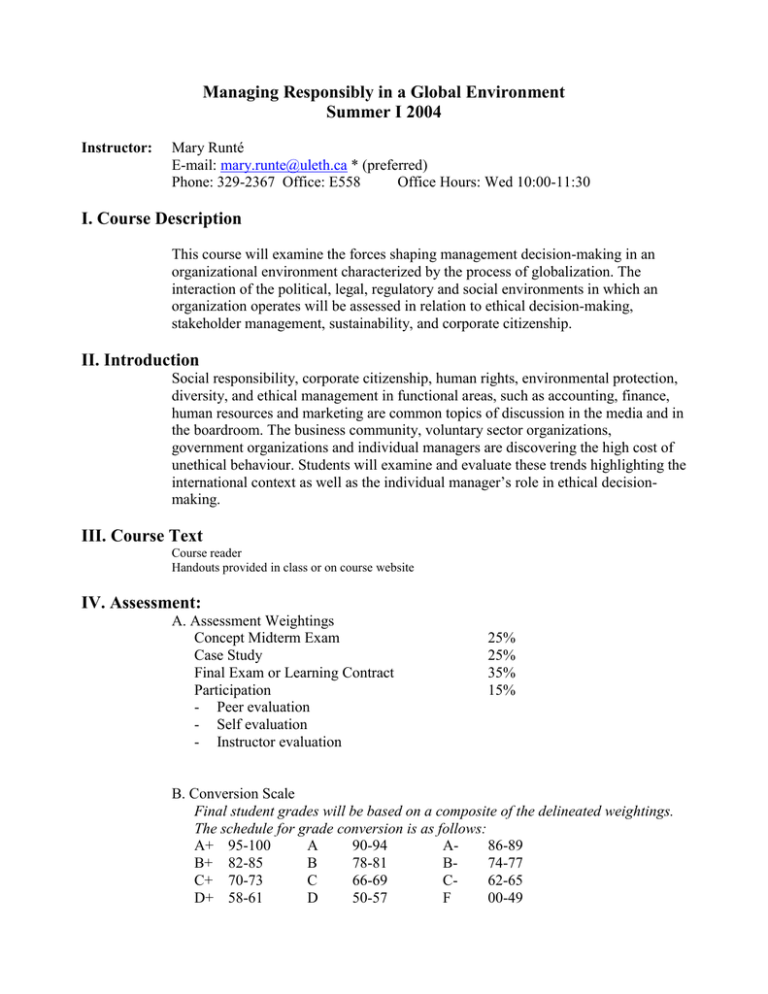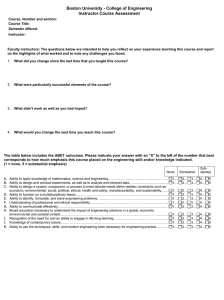Managing Responsibly in a Global Environment Summer I 2004 I. Course Description
advertisement

Managing Responsibly in a Global Environment Summer I 2004 Instructor: Mary Runté E-mail: mary.runte@uleth.ca * (preferred) Phone: 329-2367 Office: E558 Office Hours: Wed 10:00-11:30 I. Course Description This course will examine the forces shaping management decision-making in an organizational environment characterized by the process of globalization. The interaction of the political, legal, regulatory and social environments in which an organization operates will be assessed in relation to ethical decision-making, stakeholder management, sustainability, and corporate citizenship. II. Introduction Social responsibility, corporate citizenship, human rights, environmental protection, diversity, and ethical management in functional areas, such as accounting, finance, human resources and marketing are common topics of discussion in the media and in the boardroom. The business community, voluntary sector organizations, government organizations and individual managers are discovering the high cost of unethical behaviour. Students will examine and evaluate these trends highlighting the international context as well as the individual manager’s role in ethical decisionmaking. III. Course Text Course reader Handouts provided in class or on course website IV. Assessment: A. Assessment Weightings Concept Midterm Exam Case Study Final Exam or Learning Contract Participation - Peer evaluation - Self evaluation - Instructor evaluation 25% 25% 35% 15% B. Conversion Scale Final student grades will be based on a composite of the delineated weightings. The schedule for grade conversion is as follows: A+ 95-100 A 90-94 A86-89 B+ 82-85 B 78-81 B74-77 C+ 70-73 C 66-69 C62-65 D+ 58-61 D 50-57 F 00-49 C. Evaluation Tests: Examinations are based on material covered in the lectures, the reader and other provided materials. Students will be responsible for the assigned readings (text and supplementary materials whether reviewed in class or not), class discussions, presentations and videos. Failure to attend the in-class exam or meet a takehome exam deadline results in a zero on that test. OPTIONAL : Learning Contract Students have a choice! Students must decide by the beginning week 3 whether they wish to write a final examination or accept an alternative form of evaluation—the learning contract. (The default for students who don’t identify a choice is the final exam). The Learning Contract is intended to offer students much more flexibility, opportunity, and hopefully, enjoyment as they explore an aspect of social responsibility that interests or perplexes them. Students who choose this option enter into a Learning Contract that outlines their learning objectives and how they intend to accomplish these objectives during the course. The purpose of the learning contract work is to stimulate you throughout the semester to become involved in your own learning, and to develop your own reactions and ideas in response to readings and class activities. The idea is to analyze, criticize, integrate, develop your own ideas, etc., using the course content as one of your main inputs. Outputs from Learning Contracts have varied widely in the past and have included research papers, class presentations, case studies, reference catalogues, guest speaker panel presentations, interview transcripts, etc. This must be negotiated with the instructor and the instructor will determine the format and timing of this exam. Learning Contract outputs are due by the date of the final exam, but may be submitted earlier. Detailed instructions are included in "Notes On Contract Learning", which will be distributed to interested students during the second class period. Participation: Students will engage in self evaluation, peer evaluation as well as be evaluated by the instructor on the basis of active, professional and constructive participation in the class discussions and outside class course related activities. In all organizational settings, but particularly when facing social and ethical dilemmas, the ability and willingness to voice opinions and share information is critical. Having concerns, input or objections to your colleagues’ viewpoints regarding an ethical position will not contribute to ethical or socially responsive decision making unless you share your insight. Peer interaction is an important component of learning. In organizational settings, 360 degree feedback has become a norm—employees are evaluated and evaluate peers, subordinates and supervisors. This is particularly important when one is evaluating professional and ethical conduct. As such, it is essential to attend actively to the contributions others are making to projects, discussions, meetings etc. Students will be given opportunities to interact with their peers and evaluate whether their peers’ interactions contribute meaningfully to the class. Further, you will be engaging in self evaluation—do you feel that you contributed meaningfully? Detailed criteria will be provided for peer and self evaluation. Professional interaction and engaged participation that contributes to the learning and engagement of others are the key criteria evaluated. The instructor maintains ultimate discretion over the awarding of all participation grades. Failure to submit self evaluations by the deadline to be announced in class will be interpreted to mean that you are awarding yourself a zero for participation. Case Study: Students will be provided with a written case to analyze using the concepts and principals taught in the course. This assignment will be done in pairs; students may chose to do this project individually by special arrangement with the instructor by the 2nd week of term. when students designate their case partner. Students who have not designated a case partner by the end of the 2nd week will be randomly assigned partners by the instructor. D. Classroom attendance for regular class periods, while not mandatory, is strongly encouraged. Attendance for tests and in-class assignments is mandatory and absence will result in an F for that test or assignment. Attendance for guest presentations is mandatory and 2% will be deducted from participation grades for each absence. (For example: for a student whose cumulative participation grade is 13/15, one absence would result in the grade being lowered to 11/15. Attendance will be taken at the beginning and end of class and presence is required both at the start and end of the period to constitute attendance. Plagiarism and Cheating: Students are referred to the University Handbook for the University policy on plagiarism and cheating. Maximum penalties will be applied. It is not my policy to allow alternate sittings of exams except with prior notification and documentation of medical or exceptional circumstance and only within a reasonable time-frame (once the exam is returned to other students, make-up tests will not be allowed for any reason.) Baring extremely grave circumstances, notification (with documentation) of the need to miss an exam must be provided a minimum of 24 hrs before said exam. A grade of zero will be given for any missed exam. Extensions are not given for any circumstance for take-home exams or for group (paired) assignments. Assignments and take home exams/projects are due at the BEGINNING of the class period. Late assignments and take home exams will receive a grade of zero. Emailed assignments are accepted if they are appropriately addressed (make sure that you identify it in subject line, .—for example—Subject: Case exam Mgt3031A. Title the document with your surname(s)… for example: Smith.doc. Also, label the document with your name on a title page which is part of the same document as the paper or as a header on the document.) IV. TENTATIVE COURSE STRUCTURE: DATE May 10 READINGS May 12 The Social Responsibility of Business is to Increase its Profits (Friedman) A Critique of Milton Friedman’s Essay: The Social Responsibility of Business is to Increase its Profits The Virtue Matrix Corporate Social Responsibility (Wexler) When Ethics Travel May 17 May 19, 26, 31 June 2 June 7 June 9 June 14, 16, June 21 Ethical Principles: Quick Tests and and Decision Making Guidelines Guest lecture Stakeholder and Issues Management Approaches The Value in Diversity Other readings/topics to be determined TOPICS Introduction to course, overview of course outline The context for social corporate responsibility The “purpose of business” Corporate Social Performance Corporate Social Responsibility Models Ethics To be announced Test Corporate Social Responsibility in Practice Case due June 14 Topic: Diversity
